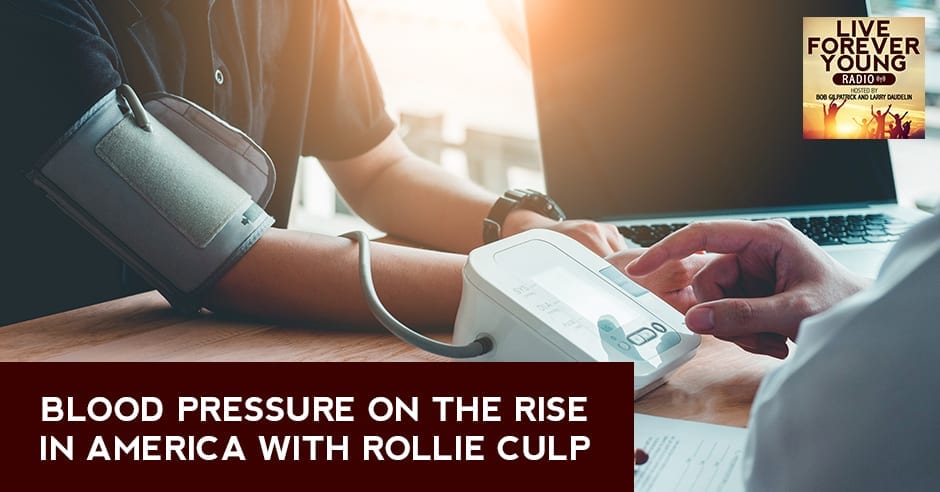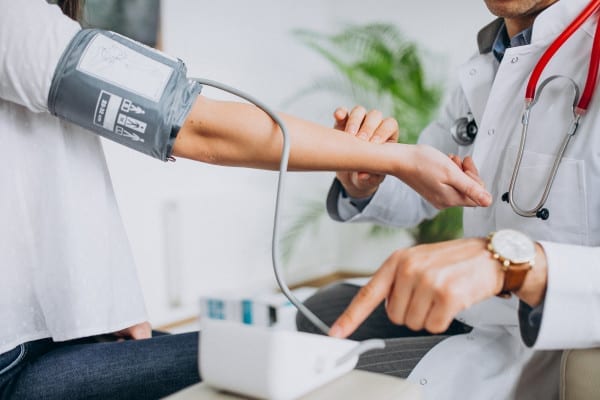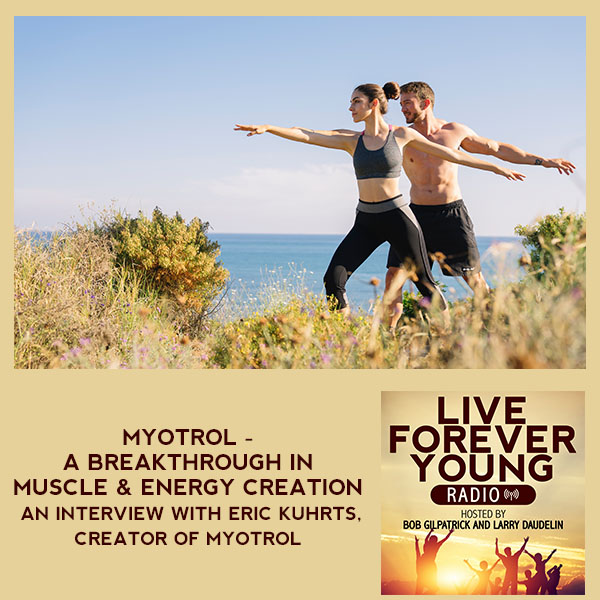
Forty-six percent of Americans have an issue with blood pressure, which is slowly making its way into the younger generation. On the show today, Bob Gilpatrick and Rollie Culp explain the basics of blood pressure and identify the different factors that can negatively affect it. They also share some great techniques you can use to naturally regulate blood pressure and keep your heart health strong. So sit back, relax, and get ready to live forever young.
—
Watch the podcast here
Listen to the podcast here
Blood Pressure On The Rise In America With Rollie Culp
Blood Pressure And Your Health
Forty-six percent of Americans have an issue with blood pressure, and this issue is slowly making its way into the younger generation. On the show, Bob and Rollie explain the basics of blood pressure and identify the different factors that can negatively affect it. They also share some great techniques you can use to naturally regulate blood pressure and keep your heart health strong. Sit back, relax and get ready to live forever young.
—
I’m here with Rollie. We’re going to talk about blood pressure. Rollie, we are working at Boomers Forever Young, answering the phones when people call in. Probably about half the people that call in have an issue with blood pressure, I would say approximately.
Approximately, maybe more. A lot of people have that issue.
The people we deal with are older than average, but they say that 46% of all the people in the United States have some form of high blood pressure, even if it’s just mild to a crisis. More and more younger people are having high blood pressure. A lot of it is related to a really poor diet, as you might imagine.
You don’t have a lot of options as far as non-processed stuff now, so we’ve got to look a little harder.
Most people know when you’re talking about blood pressure, we always hear these 120/80, your high number, your systolic pressure. That’s the pressure when your heart is beating and pushing blood, and then when the arteries are relaxed when your heart is resting, that’s diastolic. That’s the low number, which they’re saying you want to try to have a little below 80. Now, they have varying degrees of blood pressure problems that they have categories for. They say normal is less than 120/80. You don’t want it to be too low, that’s just as big a problem. We’ve seen that sometimes too. Elevated is 122 to 129 and stage one hypertension is 130 to 139, over 80 to 89. Stage two is 140/90 or above.
That’s getting up there.
A hypertensive crisis is 180/120. This is when you need to be at the hospital receiving treatment.
One hundred eighty, what does that number mean now? What is that saying?
When your heart is beating, that’s the pressure on your arteries. If you’re at 180/120, you’re going to feel bad.
What would you feel?
You’re going to feel flush and feel like your heart is pounding. You’re going to probably feel dizzy as well. At that point, you’re going to know something is wrong. It’s time. People also will have headaches once it gets to that point. Some people get headaches with blood pressure much lower than that.
I heard this from either one of our shows or our other guests that we’ve talked to, I think she said that the heart only pumps blood to 75% of the body.
When you hear 120 over 80, you need to relax. Stressing will not regulate your blood pressure. Share on XThe heart is pumping blood to 25%. The rest of the circulatory system is very small and the blood moves when the arteries are opening and closing.
Vasodilation, that’s something you taught me. Vasodilation, when they open and close on their own from the residual pressure.
It’s not from the residual pressure. They’re opening from an action on the inside of the circulatory system, you’ll have a lining called the endothelium and that endothelium gets acted upon by a couple of different forces. One is nitric oxide that expands it and opens up the capillary or the arterial. The other is from electromagnetic pulses that are coming from the core of the Earth. That is opening but the high blood pressure is being measured at the larger arteries where the heart is pumping blood through. As soon as it gets through the first 25%, the capillaries are so tiny that the pumping action isn’t doing anything. What it’s doing is pumping it right up to those tiny arterials and capillaries so it’s present and then as the system opens and closes it, draws it in and moves it along.
Thank you.
We’ll say, “Why do we have to worry if we have high blood pressure?” We know from many years of research and observation that it causes things like strokes, dementia, heart disease, problems with your eyes, kidney disease in particular and aneurysms, which is an artery or vein that will burst.
That’s usually in the brain?
It can be in the brain. It can be in other parts of your body as well, including in the part of your stomach. You quite often will get aneurysms. Quite often, an aneurysm is more in this area of your body, stomach, chest area.
Are those as deadly as the ones that occur in the brain?
Yes, because it’s bursting and so you get internal bleeding. That’s why it’s good some people will see advertisements where they say, “Come in for this special checkup and we’re going to do a scan of your brain and your body.” They’re looking for any bubbles that might cause an aneurysm that could be repaired sooner. What is it that causes high blood pressure? One of the main things is inflammation. Numerous doctors believe that most people with high blood pressure that it’s being caused because they have high inflammation, meaning systemic inflammation throughout your body. We’re going to talk about, how do you know if you have that? What kind of tests can you get? What do you do about that?
This isn’t just I got injured and I got inflammation. This is throughout the body.
Stress is a well-known cause of high blood pressure. Stress has a negative effect on your adrenals. Having problems with your adrenals can cause high blood pressure and also with your thyroid. Thyroid hormones that are out of balance can cause high blood pressure. Also, if you have kidney disease. Kidneys have a very special relationship with your blood pressure and they are sending hormonal signals that are helping regulate your blood pressure and blood volume. Another really bad thing is sleep apnea. Sleep apnea can cause high blood pressure. If you can remember for us, Rollie, later on, when we talk about what to do, remember a brand-new treatment called Vivos for high blood pressure.
I won’t forget that word, Vivos.
The other things are excessive alcohol and smoking. There are still between 20 million and 30 million people in the United States that smoke cigarettes. Overweight and obesity, also a contributing factor. Lack of exercise, and another big one right up there with inflammation is poor nutrition.

That sounds like a perfect storm of bad blood pressure. A lot of people have multiple of those issues too so then that compounds that even more.
Some of these cause more inflammation, which is right there at the top. When you talk about poor nutrition, this has been talked about for many decades where the first thing your doctor would tell you is to try to limit your salt intake. Still to this day, in people’s diets, there’s about five times as much salt as they need and about five times as little potassium as they need. Magnesium is another one. We’ll talk about all the positive nutrients that contribute to healthy blood pressure. We’ll go over that. In general, you want to make sure that your sodium and potassium ratio is in balance and that you have enough calcium. People who are low in calcium, that also has an effect on blood pressure.
There are a lot of things.
We’ll take the inflammation part first. We’ve done a whole show on inflammation.
If you haven’t read it, check it out on Live Forever Young Radio. It’s a show all about inflammation and how it affects your health and it does more than just one thing. That’s why we want to talk about it a little bit more and zero in on it on how it affects blood pressure. That’s a good thing.
There are doctors when people, especially children, come to them with high blood pressure, the first thing they do is look at their inflammation and they endeavor to get it down. In about 65% of the cases, the blood pressure can be controlled by controlling inflammation in these studies with children.
Children with high blood pressure are fairly new. That didn’t happen a lot before.
A lot of it is diet and stress. A couple of things with diet, tons of sugar, sugary drinks are definitely going to play a contributing role because the sugary drinks cause inflammation.
All sugar that doesn’t get used turns into free radicals and creates inflammation.
The other thing is technology. Video games create a lot of stress in children and can create not only high blood pressure but autoimmune issues, allergies.
Also, they’re not moving because they’re behind the game console.
They’re not moving and instead, they’re playing video games which quite often are violent. Violent video games create a situation in a child’s brain where they’re of the belief that things are not okay. When you’re being shot at in a violent video game, your unconscious mind doesn’t know that it’s not real and your body reacts as if you’re in a war.
That’s like when we talk about revision scissors. You can trick your subconscious into believing that you’re revising it with the right thing. Video games can zero in on that same subconscious.
Stress is a well-known cause of high blood pressure. Share on XThey trick your frontal cortex, your heart muscle, and your amygdala into believing that we’re in a crisis. You have all the attendant PTSD type of illness onset that are similar to someone having been in a war. I’ve done therapy for children before who were sick and the reason was they were spending all their free time playing violent video games. We had to use a particular technique called CranioSacral Therapy for the immune system to reset their immune system and also help the parents, grandparents and the child to get back on track. Meaning, if you could do what you loved, what would it be that you would be doing as opposed to shoot them up video games? You would see that the child’s allergies and other issues related to immune stress and the immune problem would go away.
That’s impressive. That does a number on your psyche, so be careful with what you’re playing on the video games.
I’ve seen a situation where one particular person went from being sick in playing video games to changing their life path and focusing on what they wanted to do, in this case it was acting, music and dance. This was probably more than fifteen years ago that they did this. The person now is a world-class athlete. World-class like top ten in the world in its class. This is the difference it can make if you can notice things like high blood pressure or autoimmune issues in children and if it’s being caused by video games, then you’re going to need help to cut them out.
Here are the things with inflammation in general. A lot of inflammation is caused by too much sugar. It’s still to this day, 25% of all the calories in the United States are consumed from drinking soda pop. You also have other sugary sports drinks, food with lots of sugar in it especially processed foods. In the processed foods, you have oxidated fats, trans fats, which are highly inflammatory. Some doctors think even more so than the sugar. It’s very difficult to not be inflamed if you are not paying attention and you don’t know where the inflammation is coming from and what to do.
What we do at Boomers Forever Young to help people with inflammation, first, what’s causing it? Secondly, what can we give you in the form of nutritional supplements to knock it down? Some people, no matter what they do without antioxidants, are still going to be inflamed. A person with diabetes who can’t get their A1c down below six is going to have constant inflammation. We have people that use our nutritional supplements that even with a high A1c, your blood sugar inflammation is almost imperceptible.
How does that even happen?
When you have high inflammation, it’s because you’re producing free radicals, radicals and reactive oxygen species. To get them down, you need to ingest free radical scavengers in the form of things like superoxide dismutase, trimethylglycine, glutathione and also what they call the ACE vitamins, vitamin A, C and E. That’s the issue with inflammation.
All those are just lists of antioxidants.
Those are antioxidants in the powders that we have at Boomers Forever Young, sprouted barley seeds and SOD. The product, Boomer Boost has trimethylglycine, proanthocyanidins and vitamin A, C and E. Coenzyme Q10 and glutathione are all in that product. When you take them both together, you see your inflammation come way down and more often than not, your blood pressure also.
It’s because they’re so closely related.
The next thing is you want to avoid toxins because toxins can create inflammation and can lead to high blood pressure. The good news is the toxins you pick up in the environment like tire dust, car fumes and the like, and also toxins from eating overcooked meat can all be scavenged in addition by these free radical scavengers, which tend to act to remove toxins from your body, including mold. A lot of people get overexposed to mold and it gets in their body, on their body and it proliferates.
You’ve got to get that out.
Quite often, with superoxide dismutase, the mold will come out of your body.

That sounds scary.
It’s a good thing. You want to give yourself a fresh start with this cleanse. We mentioned overcooked meat, a big cause of toxicity that can lead to high blood pressure.
It’s those crispy bits they like to eat off the grill. That’s not good for you.
Any meat that is cooked over 300 degrees on dry heat. Even if it doesn’t become blackened, if it’s heated up over 300 degrees, which most of the time it is and with no liquid, it creates glycotoxins in the meat. It’s one of the leading causes of cancer and it causes inflammation.
I’ve heard you say, when they look at these things under a microscope, they do not even identify. They tell you, “Get that away from me. I don’t know what that is.”
It’s a glycotoxin.
They can’t even identify it.
The other big thing is exercise. There’s a definite correlation between a sedentary lifestyle and high blood pressure. People want and need an easy way to exercise. It has to be easy. The best thing that I know of is you get a stretch band or stretch cords and use them for resistance exercise. Also, simply walk, build your way up, walk a few steps more each day. Walk a little faster each day.
Park farther away from the grocery store so you’ve got to walk a little further. One of the things that I was thinking about when we’re talking about getting active is a lot of people are working from home with everything that’s going. A lot of people, even if they weren’t working from home, they’d be sitting somewhere. We’ve got to break that idea of “I’m working so I have to sit.” When you’re on a phone, you’ve got a cell phone, stand up and walk around. I see you walk out in the back of the alley every day.
I walk a couple of miles while I’m on the phone.
It’s true. I know Bob is on a good call because he’ll sit outside and walk up and down the alley 30 times. I’m serious. That’s one of the things you can do. It’s simple. It’s easy. You’re not tethered anymore by a wire to your desk if you’re on a cell phone. Use that to your advantage and get up and move.
Rollie, we promised to talk about sleep and Vivos. Sleep apnea is one of the things that can cause high blood pressure.
Sleep apnea, that’s when your tongue covers your air hole? What the heck is it?
You have to keep moving. It can regulate your blood pressure. Share on XYou’re narrowing the air passage and it can be from your tongue or more than likely, it’s from the shape and structure of your face. Many years ago, it used to be that babies were breastfed for a long period. It changed the shape of their jaw and it changed the shape of their palate. The top part of the palate was much wider. Now, babies aren’t breastfed for that long and they also have formula and mashed up baby food. It used to be that babies had to learn to chew food more when they were younger because they didn’t have commercial baby food. Babies were nursing more and chewing more and they had a different structure to their face and their breathing airway was wider open.
This is common?
Yes. Vivos was created by scientists that understood this and it’s like braces for your palate. It’s shaped to your palate. It goes up inside your mouth and it’s pushing your palate apart. It’s slowly widening it. Your body generates its stem cells. Those stem cells will build new bone in your mouth and you can widen your mouth with this strategy as if you had nursed and chewed when you were a young child.
It can still be done later in life?
Yes. This is a device that pushes apart your palate, rebuilds your bone and it’s an actual cure for sleep apnea so you don’t have to continuously use the CPAP breathing machine. That’s a really important thing because sleep apnea not only causes high blood pressure but a lot of other problems. That’s the issue regarding sleep. We talked about stress. We have used a device that is called Inner Balance from the HeartMath Company.
It’s very unique. It’s something you should check out.
This is a device that clips to your ear and it has a transponder that’s communicating to an app on your cell phone. The app on your cell phone is going to be giving you feedback as to what’s going on with the detection of this device, particularly what’s going on with your heart. You can know a lot about your health and state of mind from how your heart is beating, and your heart can beat with varying degrees of variability. You want your heart to beat with variability because when it’s beating with variability, it’s signaling your brain that everything is okay. It’s signaling your amygdala in particular, which is a part of your brain that is regulating your stress response and communicating with other parts of your brain if everything is okay or not. It then results in your hypothalamic and pituitary-adrenal access, which is controlling your adrenals secretions. Stress relates to your adrenals relates to your blood pressure. The Inner Balance device knows what’s going on with your heartbeat and there are instructions on how to change it, which is essentially sinking your breath very consciously and rhythmically and focusing your mind on what you’re grateful for.
Lingering the gratitude.
The longer you’re lingering gratitude, the more variability in your heartbeat. The signal goes to your amygdala that says everything is okay, which signals your frontal cortex that everything’s okay, which signals your heart that everything is okay.
That works because not only have I used the product, the Inner Balance, but what its goal is to try to get you to do that without having something clipped to your ear. I have to say, I use that. We talked about morning routines. It was a show on Live Forever Young Radio, you could watch the video there. What we were talking about was using our morning routine to get going. I’ve used that technique in my morning routine. Sometimes you wake up and you are like, “What’s going on? What do I have to do now? What am I going to do?” I find that the best thing to do is wake up, take a couple of deep breaths. The first thing I did the other day was thinking about how grateful I was to have my daughter. I get to wake up with her every morning and get her ready for school. She starts my day out well. It made all that anxiety about not knowing where my shoes were or maybe not knowing if my pants were cleaned. It made it all go away because it didn’t matter. You’re grateful for the fact that you can wake up and have a purpose, in this case, it was my daughter. It helps you focus like that. I think you should check it out.
It works. The Inner Balance device by HeartMath is really like a miracle. What happens is when you’re looking at the computer, the app on your phone, you see this circle in the middle. It looks like a mandala.
It goes in and out.
Its shrinks and expands. It gets smaller and bigger and what you’re doing is sinking your breath to the sizing of this mandala. Outside of the mandala are these little boxes, and based on what’s going on with your heartbeat, the box fills in with a different color. Filling in with red, you’re still in anxiety. Filling in with blue, you’re getting there. Filling in with green, your amygdala has changed.

You’ve got that variability going.
Your heart rate has changed. You get to watch what’s going on in real time. At the end, when you stop five minutes later, half-hour later, however long you want to do it, it records that session, stores it in the cloud and you get to watch your progress. You get to tweak the relative difficulty in the app by changing it. Start with level one, you can go to level 2, 3 and 4. You get higher and higher scores as you get better and better. The app, they say that with the average American, they believe that things are not okay 95% of the time.
That’s scary.
What happens with Inner Balance is you can move that from 5% of the time I think things are all right to 10%, 20%, 50%. If you focus and use it consistently over time, you can become a person who believes that everything is okay unless it’s not. It’s not just your belief structure that’s doing this but there’s some issue that’s an emergency. That’s the best way that I know of to manage their stress. The other thing is the issue of nutrition. We know from research that people that have a low vitamin D3 level are highly susceptible to having high blood pressure. Most people don’t know their D3 level, it’s the sunshine vitamin and it needs to be up in the range of 70 to have maximum benefit for your body. More than half the people that have high blood pressure have extremely low vitamin D levels.
I’m glad that you brought this up because I get this question a lot. A lot of people ask, “I’ve tried a bunch of different stuff, a bunch of different medications but my blood pressure number is still really high. What am I doing wrong? What am I not looking at?” This would probably be one of those things that if you’re doing a lot of stuff to try to get your blood pressure down and it isn’t moving, this is probably one of those aspects you want to look at.
It’s one of the things that you would want to get tested. You want to ask your doctor the next time you go for blood work, “I would like to know my vitamin D level. I would like to know my iron level. I would like to know my CRP level,” which is your measure of inflammation, “My A1c,” which is your blood sugar over a period of time. By getting those numbers under control, most of the time you can address blood pressure issues. If you have a high CRP or measure of inflammation, you can use SOD and trimethylglycine, etc., to get it down. At the same time, you increase your vitamin D3 level. Most of the time people’s blood pressure will come to the normal range. You want to make sure you get your iron checked because a lot of people have high iron. High iron causes inflammation. High iron creates a situation that elevates inflammation because the iron interacts with hydrogen peroxide, which is produced as a by-product of your Krebs cycle from your mitochondria. The combination of the two makes a nasty, free radical that damages the lining of your mitochondria severely.
The iron and the hydrogen peroxide?
Yes. You can scavenge it but you’re also better off not making it. You want to make sure your iron level is under control.
How do you get it down if it’s too high?
Go and donate blood.
That’s a pretty simple solution.
Some people can do that and feel a lot better. If you have high iron levels and you’re damaging your mitochondria, it is going to make you feel tired. Also, iron levels are related to your level of testosterone. You want to make sure that you know your iron level. If you hear from your practitioner, “Your iron is fine. It’s in the range,” you want to look at that yourself and say, “Is it at the top of the range and one more tick and it’s out of the range?” The doctors that research this say bring it down to about 20% above the low end of the range. You want enough iron because it’s involved in oxygenation and you want to have enough but as it starts to creep up, you’re creating too much inflammation.
People need an easy way to exercise, and a simple way is to walk. Share on XIt’s funny, you were talking about going to your practitioner. Another one of the things that people have dealing with, my wife is one of them, they get the thing called white coat syndrome. It’s where they get to the doctor and then their blood pressure shoots the roof, probably from anxiety, being anxious.
Some research shows that as many as 30% of the people diagnosed with high blood pressure don’t have high blood pressure, that it’s from white coat syndrome.
How do you get a test on the blood pressure without freaking out?
What you want to do is test your blood pressure. You want to test your blood pressure at various times of the day, keep track of it. If you find that when you get to work, your blood pressure starts to go up, it might be a good time to pause during a 10 or 15-minute break and use an Inner Balance device or center your breathing, rhythmic breathing while you focus on what you’re grateful for. You want to have those measurements of your own when you’re not in the presence of a doctor so you can show the doctor what it is without a white coat.
That’s what I would think. You’d have to probably write down what it’s like when you’re not near them and say, “I’m fine when I’m not with you but when I come in here, it goes up.”
Also, blood pressure can go up based on your diet over the last few days. If you ate a lot of salty potato chips or something like that and there are trans fats in these potato chips along with a lot of salt, it can easily raise your blood pressure. It might be temporary, you might not need medication but the doctor is not going to know that and you’re probably not going to think to tell him, “I just ate a whole bunch of potato chips.” The other thing that people can do is when they go to the doctor. While you’re in the doctor’s office waiting to go in, use the Emotional Freedom Technique. You use tapping. Tap on the sides of your nails.
Up until now, how would it go?
I would say, “Even though up until now, I thought that I had to have this white coat syndrome, when I get to the doctor I get nervous and my blood pressure goes up, I completely love and accept myself. I’m so grateful now that I realize I have control of that. I’ve calmed down and I’m feeling that complete peace.” Cross your hands, cross your heart, take a deep breath in and let it out. There are those lights. Did you see those lights?
I felt that. What is that?
That’s a long, complicated discussion for another day.
I was thinking maybe that means your blood is flowing better. I don’t know.
No, it’s a complex metabolic pathway that involves oxytocin, dimethyltryptamine and melatonin.
We’ll save that for another one.
You do that and see flashing lights.

You do. It starts around here and then it goes across your eyes. It’s fricking cool.
That’s a great way to relax when you’re at the doctor’s. The last thing I want to talk about is the issue of nutrition because nutrition has a huge effect. We talked about vitamin D3, which is important. Vitamin D3 has a positive effect on the metabolic pathways where your kidneys are regulating blood pressure and blood volume. If your D3 is low, it’s hard for those communications to occur. The other thing is vitamin C has a very positive effect on blood pressure, coenzyme Q10, an enzyme involved in your Krebs cycle in making energy, and also phosphatidylcholine. Phosphatidylcholine is made from your genetic code. Choline is a compound that you get from food and you convert it to phosphatidylcholine and this helps to make up the cell wall.
Cell walls can be functioning very well and be elastic, fluid, allow nutrients in and toxins out to be removed by your lymph system but with low phosphatidylcholine, that system won’t work as well. As you age, you make less phosphatidylcholine. That’s why age is one of the main reasons why people want to check your blood pressure more often because as you age, you’re more likely to have it and part of it is because you’re making less phosphatidylcholine. We have phosphatidylcholine in our Boomer Boost product along with the other antioxidants.
It’s 70 different nutrients and those are in there. I’ll tell you that.
Sometimes, if people have stubborn high blood pressure, you might ask your doctor about taking a little more phosphatidylcholine up to 1,000 milligrams and then watch and see what happens. Sometimes, when people use great nutrition products that have all these things in it and potassium, magnesium, calcium, and arginine to help dilate your vasodilation, what can happen is if you’re on blood pressure medication, your blood pressure can get too low. You always want to work together with your doctor and say, “This is what I’m going to do. I’m going to start exercising. I’m going to release some weight. I’m getting my Vivos device to help with my sleep apnea.”
“I’m getting my HeartMath device.”
“I’m going to stop eating so much food with sugar and sodium and I’m going to be taking these nutritional supplements that contain ten different antioxidants. There’s potassium, magnesium, calcium, phosphatidylcholine, arginine in these. I want to work together with you to make sure my blood pressure doesn’t go too low on the dose of medication I’m on. I’m going to be checking it every day. I’ll come more frequently to have it checked with you. If it starts to go too low then let’s see what we’re going to do.”
This would be a good time to keep your journal while you go home and you’d take your blood pressure to show you the progress.
You don’t want your blood pressure going too low for a whole number of reasons. One of them is you can get very dizzy when you stand up if you have low blood pressure. You don’t want to stand up and fall or have to worry about it every time you stand. You want to keep your blood pressure regulated within a tight range, not too high, not too low.
Optimal range.
That’s it for now.
That’s a lot of information.
Thanks to everyone for being here with us. We’ll see you the next time. Thank you very much, Rollie.
Thanks, Bob. It was very informative.
Important Links:
- Boomers Forever Young
- Vivos
- Inflammation – Past episode
- Boomer Boost
- Inner Balance
- Morning routines – Past episode






